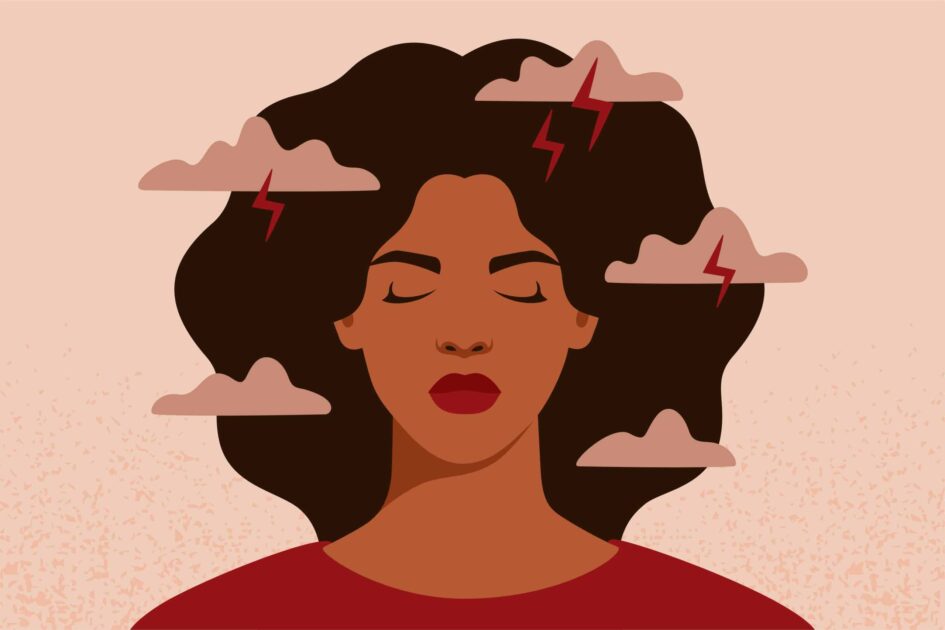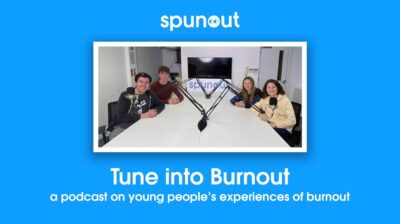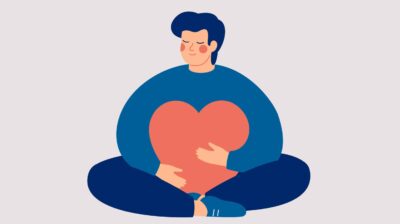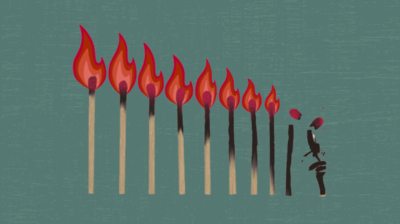How my undiagnosed ADHD led to burnout
Emma’s journey to finally receiving an ADHD diagnosis at 24 helped shed light on how ADHD symptoms contributed to burnout.

In 2020 in the first few weeks of the Covid-19 pandemic I downloaded TikTok and was immediately hooked. After months of perfecting my algorithm I felt I had a tailor made feed that was a direct projection of my sense of humour, my interests etc. It was here that content relating to ADHD started creeping in subtly, and before I knew it my feed was dominated by neurodivergent, meaning differing in mental function from what is considered “typical” or “normal” ie. ‘neurotypical’, life hacks, skits, povs and confessions.
I related so much to the content and felt like I was saying “Oh my god that’s me” or “oh wow I do that all the time.” Creators were verbalising things I had felt or thought my whole life, but never knew how to say, or thought was completely normal, but apparently wasn’t. I was shook, but I still wasn’t convinced I had ADHD because I didn’t fit the stereotypical ‘bold child in school’ that never shut up or could never sit down in class, so I began researching heavily to see if I could get some answers.
I learned that ADHD presents itself very differently in girls than it does boys, with girls tending to hyperfocus on their interests as opposed to being hyperactive like boys. This is described as Inattentive ADHD. I found ADHD Ireland’s website article “Do You Show Signs of Adult ADHD?” that listed 58 traits of Adult ADHD stating ‘if you say yes to more than half of these you could be displaying traits of ADHD.’ I said yes to 41. In May 2021 I decided to get myself assessed and after nearly 8 months and a lot of money later, I was diagnosed with ADHD.
How my symptoms of ADHD contributed to burnout
I put myself under enormous pressure in work and college. I started a business apprenticeship in late 2019 where I worked 4 days a week and was in college for 1 day to achieve an Undergraduate Degree and 3 years work experience.
As Covid took over in 2020, staff shortages meant that I was thrown into the deep end with very little training, while also taking on an increased workload, all on an apprentice wage. My role requires a very high level of accuracy, as I deal in financial services, so my anxiety over making a mistake tripled in a very short period of time. I would agonise over sending an email for hours, double, triple, and even quadruple checking that I had included the right information, sent it to the right people in the right department, attaching the correct documents. It was exhausting.
Fear of failure
We had never been busier, so my workload was constantly piling up and deadlines were always on the immediate horizon. I would lie awake in bed every night obsessively repeating my to-do list, client names, found amounts or things that could inexplicably go wrong until I eventually fell asleep. When my alarm went off you couldn’t get me out of the bed on time for love nor money, and immediately my mind and heart would start racing over work.
I had a lot of respect for my manager and I couldn’t bear to disappoint her or let her down in any way, so I would take on anything she asked of me, whether I could mentally take it on or not. She would constantly praise me for how well I was doing in college and how smart and dedicated I was for taking on the apprenticeship and doing so well while we were so busy and in the middle of a global pandemic. But the fear of failing an exam or assignment sent me into a near constant state of panic and anxiety every time. The reality was I was “doing so well” in college and work because I was neglecting every other facet of my well being.
Constantly overwhelmed
After a few months of this chronic anxiety, I would just dissociate in work. This felt like, for me, turning the conscious-side of my brain off and going into autopilot mode so I could make it through the day without thinking too much. Huge chunks of my day went missing and I would almost ‘wake up’ near the end of the day not exactly remembering what I had done work/college-wise. An email would come into my inbox and I would go into a state of paralysis where all I could do was sit and stare at my laptop screen for hours until work drew to a close, and I would cram 8 hours of work into 2 to avoid being found out.
My short term memory really started to deteriorate to the point where I couldn’t remember a conversation I had had an hour ago, as my brain felt like it just couldn’t take in any further information. This also meant that every time I scheduled a GP appointment I would forget the reason I was there and would always just complain that I was tired, never getting to the root of the problem as I would say “work is fine,” “college is fine” and rinse and repeat this cycle.
I felt like the work never ended and there was no let up, no end in sight. I was constantly overwhelmed but always felt like I wasn’t doing enough or I was lazy because I was always exhausted. Everyone else seemed to have it so easy.
Putting work first
After receiving my diagnosis, I learned about the many traits of ADHD that aren’t talked about as much as hyperactivity such as Rejection Sensitive Dysphoria, which basically means I am hypersensitive to any form of real or perceived criticism. A slight change in tone or how I interpreted the tone of an email would send me into a crippling spiral of anxiety that I just couldn’t handle.
This led to an overwhelming urge to “prove” myself to my employer at every opportunity and prioritise my workload over my emotional and mental needs. I masked my ADHD very well as I had gotten by undiagnosed for 24 years, so my employer and I never knew any different.
Hyperfocus and perfectionism are traits of ADHD that don’t usually get associated with ADHD. As I enjoy my job and working I often become hyper focused on a task and can lose track of time, forget to eat, drink and even go to the bathroom. This coupled with my tendency for absolute perfection resulted in too much unpaid overtime and hours agonising over the simplest of tasks resulting in complete mental and physical exhaustion. These two traits perfectly explained what I simply thought was an above average work ethic that resulted in 18 months of complete and utter burnout.
ADHD diagnosis gave me confidence to set boundaries
People with ADHD tend to feel a lot more intensely than the average neurotypical person, so burnout has really taken a toll on me physically and mentally. I am currently on medication that has made a huge difference in how I’m able to cope with my workload and general day to day life. However, simply having a diagnosis has been the biggest change for me. I am more confident in setting boundaries in the workplace as I now know I tend to take on more than I can handle because of these traits. I am taking more time to look after my mental health and make it one of my top priorities as the consequences of burning myself out over the last 2 years are very apparent and will take a long time to remedy. I feel my diagnosis has made me better equipped to deal with things I used to struggle with everyday and things that would have otherwise consumed me.
Especially with a young person at the start of their career, many employers instil this sense of having to pay your dues or having to graft harder than your older/more established colleagues and will take advantage of this insecurity and exploit it. It is important to practice setting boundaries to preserve a good work/life balance, especially when working from home as many find it hard to log off on time.
Recovering from burnout is different for everyone
In light of my diagnosis, recovering from the stress of the last two years is my main priority. I’ve spent far too long hating on myself for my apparent failures and shortcomings. I’m kinder to myself now that I know why I struggle with certain things more than others. I know now that I’m not lazy or stupid, I simply have a different set of needs than most but I’m in the process of re-learning who I am and how to look after myself.
Learning more about ADHD and how I can navigate life with it is what makes me excited for the future, I know that with my diagnosis and experience of burnout that it won’t ever be as hard as it used to be and looking after myself mentally and physically isn’t the self indulgence I previously thought it was – it’s an absolute necessity for a happy, healthy life.
Feeling overwhelmed and want to talk to someone?
- Get anonymous support 24/7 with our text message support service
- Connect with a trained volunteer who will listen to you, and help you to move forward feeling better
- Whatsapp us now or free-text SPUNOUT to 50808 to begin.
- Find out more about our text message support service
If you are a customer of the 48 or An Post network or cannot get through using the ‘50808’ short code please text HELLO to 086 1800 280 (standard message rates may apply). Some smaller networks do not support short codes like ‘50808’.






